Are you a Quiet Speculation member?
If not, now is a perfect time to join up! Our powerful tools, breaking-news analysis, and exclusive Discord channel will make sure you stay up to date and ahead of the curve.
It's been weeks since our last "Fixing Modern" column, and that has everything to do with format-wide excitement surrounding the April 4 banlist update. I intentionally tabled the column to see how the new Modern shaped out. Early results show promise, and although we're still a month away from Grand Prix Los Angeles on May 20, I remain cautiously optimistic about where Modern is heading.
Pro Tour Shadows Over Innistrad weekend has given me new reason for cautious optimism, and it comes in a surprise announcement made at the height of the Standard-centric event. Starting in 2017, Wizards will move away from using Modern as a Pro Tour format. This update alone may have led to the same outcry we saw in 2014, one I already analyzed in-depth in my last "Fixing Modern" piece. Instead, Aaron Forsythe gave context to that change in an informative, honest, and defining statement on "Where Modern Goes From Here." Today, we'll break down this epochal decision.
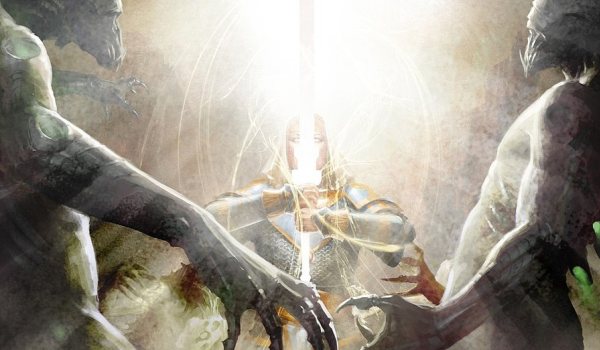
Forsythe's article went live in the wee hours of the North American morning, but I imagine most Moderners will have read it and formed a (very strong) opinion by Sunday lunch. As you may have already gathered from the article's art and the introduction's tone, I'm hopeful and excited about the changes and, more importantly, what they represent.
That said, I understand where players might feel nervous, skeptical, or downright betrayed by this decision and Forsythe's followup words. By the end of today's article, I'm hoping to alleviate some of those worries and sign you up to Team Optimism. After all, the update embodies a direct response to not just one but both of my previous pieces on "Improving Communication" and "Defining Format Mission." How could Nexus veterans not be hopeful?
Because both the decision and its explanation are such significant troves of information, this week's Part 1 will focus on the Pro Tour and Modern relationship. Next week, we'll turn to the format guidelines in a Part 2. Splitting up the content ensures I can unpack this material as much as possible without also writing a novella.
[wp_ad_camp_1]
Unpacking Source Material
Based on some of the Tweets, forum posts, and Reddit comments I read on Sunday, an alarming number of Moderners only skimmed the announcement. Some clearly didn't read it at all. This includes those who are both uncritically positive ("MODERN IS SAVED!!") and categorically negative ("RIP Modern, back to Legacy"). In fairness, there are respected, sharp players who appear to have thoroughly read Forsythe's piece and are still in one of those camps, but most of the extreme opinions are 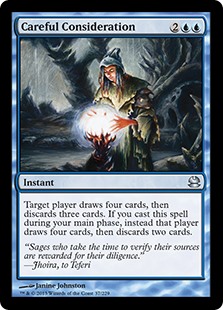 from less diligent readers.
from less diligent readers.
Before we get started, do all the other people who have to read your Internet comments a favor: re-read the article. We can all afford a few minutes to revisit a decision that took Wizards much longer to craft.
Required reading: Aaron Forsythe, "Where Modern Goes From Here" (April 24, 2016)
You can also check out Helene Bergeot's article for additional context on the decision, but Forsythe's is by far the more important of the two. I always talk about how everyone needs a bookmark folder with all their significant Modern articles. Mine is called "Modern Literature," and you can bet both of these pieces went in there the instant I finished.
As I puzzle through Forsythe's points, remember I'm offering just one take on a decision that will surely be picked apart for months to come. I will also undoubtedly revisit my interpretations as Wizards takes action through bans, unbans, reprints, tournament changes, and more.
Unlike some of my other analyses, this one is deeply qualitative and not quantitative. It's all about direct quotes, underlying meaning, and background context. One day I'll get the hard numbers to back up or challenge today's claims, but for now, let's dive in paragraph by paragraph as I argue for why you should be as tentatively excited about the Pro Tour change as I am. Unless otherwise noted, all quotes come from Forsythe's article.
No More Modern Pro Tour
Wizards canned the Modern Pro Tour before in August 2014. This resulted in an outcry so deafening that Wizards backpedaled as fast as George Mason University reversing its naming decision on the Antonin Scalia School of Law. You can read my exhaustive breakdown of the decision in my previous "Fixing Modern" article, but the key context to remember for today is how controversial and problematic this decision was two years ago.
Fast forward to April 24, 2016, when Wizards announces something very similar in an entirely different way under entirely different circumstances. Based on Modern's history to this point, whether in the Pro Tour fiasco of 2014 or the Splinter Twin banning controversy earlier this year, Sunday's decision represents a more considerate and critical approach to Modern that will ultimately benefit the format. It also represents a logical execution of the Pro Tour mission, not a sudden deviation to sink Modern. All of these factors should have us feeling confident about Modern's future going forward.
Established environments and new sets
At the beginning of his article, Forsythe leaped right into the Pro Tour removal as a way to immediately head off controversy and explain Wizards' thought process.
"As you've no doubt heard by now, we no longer plan to use Modern as a Pro Tour format as of 2017. Modern will continue to be a big part of our Organized Play offerings, both at the premier level and otherwise, but it is no longer a good fit for the Pro Tour."
Conspiracy theorists likely read this and immediately hop off the rails with alternate explanations:
- "Modern doesn't sell packs."
- "Wizards wants to kill the format and introduce a new one."
- "The new CEO plans to abandon paper for digital products."
I have no idea how much these tinfoil hat ideas informed the decision, but I'm guessing the Magic truthers are as off-base here as they are in most other areas. Forsythe claims Modern "is no longer a good fit for the Pro Tour," and this is the explanation we have to buy into. Not just because Forsythe said it so it has to be true. Rather, as we'll see shortly, because Modern is honestly not a "good fit for the Pro Tour," something we see both in Forsythe's arguments and in the external factors surrounding the decision.
Forsythe wastes no time jumping into the reasons underlying this bad fit.
"It comes down to our goals for the events. The first is that we want to reward good drafting, innovative deck building, and tight gameplay in unestablished environments.
In previous articles, Wizards made it sound like Modern did not have "innovative deck building" and "tight gameplay." See Helene Bergeot's quote about Standard, not Modern, 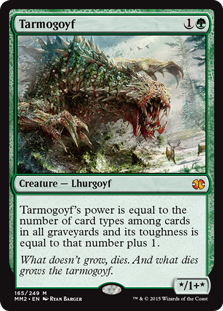 "reward[ing] players who are both good deck builders as well as skilled players" just before she announced the removal of a Modern Pro Tour. Many players may read Bergeot's tone in Forsythe's quote, but for me, that's a gross misinterpretation of the new material. The operative terms aren't "innovative deck building" or "tight gameplay." It's the "unestablished environment."
"reward[ing] players who are both good deck builders as well as skilled players" just before she announced the removal of a Modern Pro Tour. Many players may read Bergeot's tone in Forsythe's quote, but for me, that's a gross misinterpretation of the new material. The operative terms aren't "innovative deck building" or "tight gameplay." It's the "unestablished environment."
As any Modern player can attest, our format has a high degree of skill and innovation, even if skill is matchup-specific and innovation is incremental. Forsythe isn't indicting these Modern elements. That said, it's virtually impossible to argue the format represents the "unestablished environment" Wizards seeks for Pro Tours. Metagames are deeply established, with most Tier 1 decks staying Tier 1 even a year later. It's no coincidence I talk about the Big Aggro Three or Jund in virtually every metagame update, or that Tarmogoyf is a Modern Masters poster-child every edition.
Forsythe confirms this consistency later in the article.
"Our top players pointed out to us that Modern wasn't often about innovating or solving the puzzles presented by a new card set, but rather it rewarded huge numbers of repetitions with established decks, and while that kind of play can be interesting and is relevant to a lot of the Magic audience, it wasn't what the Pro Tour was supposed to be about."
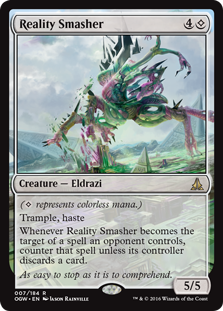 Here, Forsythe not only reinforces Modern being a relatively established format, but also gives new context to the notion of "innovation." In the past, I often read quotes like Bergeot's and Forsythe's as cheap shots at creative Modern deck building when I knew the format certainly rewarded these breakthroughs. But now, I see it's more about navigating the "puzzles presented by a new card set," not just deck building in the abstract.
Here, Forsythe not only reinforces Modern being a relatively established format, but also gives new context to the notion of "innovation." In the past, I often read quotes like Bergeot's and Forsythe's as cheap shots at creative Modern deck building when I knew the format certainly rewarded these breakthroughs. But now, I see it's more about navigating the "puzzles presented by a new card set," not just deck building in the abstract.
Although the Eldrazi of Oath of the Gatewatch certainly had a big Modern impact, most Modern Pro Tours don't feature enough new cards to shake up the decidedly established environment. Indeed, this mission is at odds with Modern's very definition as a format. Remember Sam Stoddard's quote on Modern, referenced in my "Defining Format Mission" article?
“Modern has provided us a non-rotating format that is far more accessible than Legacy or Vintage, but still retains many of the qualities that people enjoy in those formats—such as a more stable metagame, the ability to play and tweak the same deck week after week, and simply a much more powerful card pool than Standard.”
Sam Stoddard, “Developing Modern” (June 21, 2013)
Talk about a contradiction. On the one hand, the Pro Tour demands an "unestablished environment" to highlight new sets and radical format change. On the other, Modern is supposed to offer a "stable metagame" where players have the opportunity to run the "same deck week after week." This is a fundamental incompatibility which should have been acted on years ago.
Speaking of fundamental inconsistencies, this discussion ties directly to the second disconnect between Modern and Pro Tours.
"Second, we want to highlight the newest card set. To those ends, we positioned the Pro Tour events just a couple weeks after each new set comes out, which both provides the fresh new proving ground for our players and showcases each new set in a premier-level setting right at the beginning of its life cycle."
 Again, with the glaring exception of Oath of the Gatewatch, and the 2014-2015 anomaly of Khans of Tarkir, most new sets are not going to have a sizable Modern impact. Some won't have any Modern impact at all (poor Theros). The card pool is simply stronger in Modern: see Stoddard's comment about Modern having, by its nature, "a much more powerful card pool than Standard." Sure, you'll get your occasional Siege Rhinos that fit into Modern perfectly (and your Treasure Cruises that fit less perfectly), but for the most part, the Modern stage is too crowded with too many high-profile characters to showcase a new set.
Again, with the glaring exception of Oath of the Gatewatch, and the 2014-2015 anomaly of Khans of Tarkir, most new sets are not going to have a sizable Modern impact. Some won't have any Modern impact at all (poor Theros). The card pool is simply stronger in Modern: see Stoddard's comment about Modern having, by its nature, "a much more powerful card pool than Standard." Sure, you'll get your occasional Siege Rhinos that fit into Modern perfectly (and your Treasure Cruises that fit less perfectly), but for the most part, the Modern stage is too crowded with too many high-profile characters to showcase a new set.
All of this makes Modern doubly inappropriate for Pro Tours---the format is both an established environment and it is unlikely to show off new cards.
Historical Pro Tour definitions
Some players still detect an ulterior agenda in Forsythe's article, as if Wizards suddenly pulled the plug on a long-time Pro Tour format to advance sinister aims. It's an attractive theory because we love exposing huge corporate conspiracies, but it's also totally misaligned with the history of the Pro Tour itself. Wizards didn't suddenly change the Pro Tour to kick out Modern. Wizards finally realized Modern was a bad fit for a tournament with historical goals at odds with the format itself.
A number of passages from previous Pro Tour articles and announcements show the tournament's longstanding mission.
"By aligning the Pro Tour so closely to the launch of a new set, the Pro Tour becomes the exclamation point to the Dark Ascension release season... Our expanded Pro Tour coverage will highlight the top players in the world showing off the latest deck ideas and strategies from the new set."
Event staff, Pro Tour Honolulu Announcement (August 24, 2011)
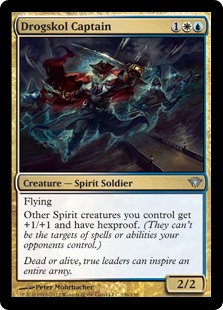 Even before the first Modern Pro Tour, Wizards had already decided to align the tournament with a set release. Their goal: showcase "the latest deck ideas and strategies from the new set." How else was Drogskol Captain going to get time in the spotlight in Top 8 strategies? This echoes exactly what Forsythe would go on to say five years later. Bergeot and other authors also took up this charge in their own Pro Tour endorsements.
Even before the first Modern Pro Tour, Wizards had already decided to align the tournament with a set release. Their goal: showcase "the latest deck ideas and strategies from the new set." How else was Drogskol Captain going to get time in the spotlight in Top 8 strategies? This echoes exactly what Forsythe would go on to say five years later. Bergeot and other authors also took up this charge in their own Pro Tour endorsements.
"In February 2012, we aligned the Pro Tour with the release of our new card sets, with Pro Tours being named after the most recently released set and taking place two weeks after that set's release. Pro Tour Dark Ascension was the first of these Pro Tours, setting the stage for each Pro Tour to follow."
Helene Bergeot, "Magic Tournament Video Coverage in 2016" (December 8, 2015)
Writing in 2015, Bergeot reflects on the historic pre-2012 decision to align Pro Tours with set releases. This shows Dark Ascension's release wasn't just a one-time fluke or an accidental launching of the new Pro Tour structure. Rather, it was a formative beginning for a new way of running this critical Magic event. Even though Bergeot was looking back from 2015 to 2011, her quote still identifies Wizards' intentions in making the shift. Bergeot also confirmed this purpose in February of 2013 (emphasis added).
"Adding a Pro Tour will put more of the game's greatest players, new cards, and top decks on display to a worldwide audience while providing further Pro Tour Qualifiers around the globe."
Helene Bergeot, "Fourth Pro Tour Coming in 2014" (February 18, 2013)
Whether in this update or the Pro Tour previews and announcements for virtually every single Pro Tour that followed (for example, see Rich Hagon's language in both the Pro Tour Battle for Zendikar FAQ, and the preview for Pro Tour Dragons of Tarkir), we continually see Wizards' emphasis on spotlighting new cards from new sets.
To be sure, there is absolutely a marketing element in this decision, and one that was very deliberately reinforced in 2011. That isn't a bad thing! Magic is run by a company, and the company cannot pay salaries and make new cards without marketing its products. By all measures, the Pro Tour will continue to serve that marketing function, among goals like giving players something to aspire to. Based on that, Modern is not now, will not be, and has never been an appropriate format for the event.
More Pro Tours, more bans
We've already seen Modern's established environment conflicting with the historical Pro Tour requirements for an "unestablished environment." We've also noted the tension between the Pro Tour's long-running need to show new cards and the well-defined Modern rarely accomplishing this end. Wizards noticed this too, for years relying on an infamous policy to force a square peg into a round hole: banning cards before Pro Tours to induce an artificial shakeup. I've discussed this at length in multiple articles on the Twin banning, and Forsythe's recent update represents a vindication for both players like me who identified this problematic behavior, and for the format as a whole. Now, we can retreat from this harmful policy.
Adding context to the Pro Tour and Modern disconnect, Forsythe takes on this banning issue.
"In order to try to present the players with a new environment to explore, we'd implement the changes to the banned list that we had identified throughout the previous year right before the Pro Tour, which often cast a shadow of dread over the impending Pro Tour for many of the format's fans, as the spotlight of a Pro Tour accelerated the rate at which we'd ban problematic cards in the format."
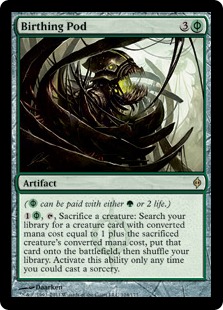 We've seen this before in Tweets, articles, podcasts, and numerous other sources, but now we get it straight from Forsythe in an official Wizards medium. Pro Tours "accelerated the rate at which [Wizards would] ban problematic cards in the format." Does this mean Pro Tours directly caused bans? Not necessarily; problematic cards are almost certainly identified as problems independently of the Pro Tour. Forsythe even says as much himself, so don't think your Birthing Pods and Dig Through Times would have been spared for long if at all. That said, do the Pro Tours hasten a card's demise? Absolutely, and now we have the most definitive proof of this to date.
We've seen this before in Tweets, articles, podcasts, and numerous other sources, but now we get it straight from Forsythe in an official Wizards medium. Pro Tours "accelerated the rate at which [Wizards would] ban problematic cards in the format." Does this mean Pro Tours directly caused bans? Not necessarily; problematic cards are almost certainly identified as problems independently of the Pro Tour. Forsythe even says as much himself, so don't think your Birthing Pods and Dig Through Times would have been spared for long if at all. That said, do the Pro Tours hasten a card's demise? Absolutely, and now we have the most definitive proof of this to date.
Here, Forsythe admits Wizards was banning cards ahead of schedule just to rock the Pro Tour boat in an otherwise established environment. Perhaps they did so with the added incentive of making it more likely for a new set to shine, although that's more speculative than provable. The shakeup factor, however, is no longer debatable. In order to align Modern with Pro Tour requirements, Wizards had to somehow stir around a format that was just too established to fit their marquee event. Although this did lead to some Pro Tour changes, it absolutely "cast a shadow of dread" across the entire format and event. Cardboard Crack's notorious Modern comic actually misplaced the fear---the dread was rampant before Pro Tour coverage even commenced.
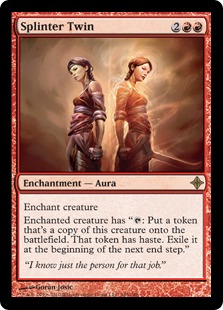 With no more Pro Tours, Modern should see a significantly less aggressive banning policy over the coming years. Bans will still happen, but we shouldn't repeat the Splinter Twin debacle. This is a huge positive for Modern players who just want to invest in a deck, use it over the years, and not see R&D take a bite out of it every 12 months like clockwork. Given how prevalent Modern ban mania has been since the format's birth, and given how much it adversely shades so many Modern interactions, I expect this to be a decisive turning point in Modern and a net benefit going ahead. It certainly represents a more organic approach to metagame management, one Forsythe himself emphasizes in the article.
With no more Pro Tours, Modern should see a significantly less aggressive banning policy over the coming years. Bans will still happen, but we shouldn't repeat the Splinter Twin debacle. This is a huge positive for Modern players who just want to invest in a deck, use it over the years, and not see R&D take a bite out of it every 12 months like clockwork. Given how prevalent Modern ban mania has been since the format's birth, and given how much it adversely shades so many Modern interactions, I expect this to be a decisive turning point in Modern and a net benefit going ahead. It certainly represents a more organic approach to metagame management, one Forsythe himself emphasizes in the article.
"We'd rather let those deck evolutions play out over months on Magic Online or at store-level events, as that accelerated metagame pace often just means speeding up more changes to the banned list as well."
This returns to Stoddard's definition of Modern metagame stability. It also harkens back to Modern's inaugural mission, one defined by Tom LaPille in "A Modern Proposal" back in 2011: “…many of you have called for a non-rotating format that doesn’t have the card availability problems of Legacy. We propose Modern as that format.” This foundational promise of a non-rotating format was incompatible with the Pro Tour-timed banlist rotations we've come to expect. By returning to this more organic process of format evolutions, Modern should also return to the roots at the core of its success and popularity.
Modern without its Pro Tour
In the end, Forsythe's article and the related Wizards announcement put Modern into new waters. New waters are scary, uncertain places for everyone, not just Magic and Modern players (even if it seems we are unusually phobic towards any change at all). Looking back on Forsythe's discussion of the Pro Tour, here are the core arguments to remember.
- Pro Tour purpose: Historically, Pro Tours should showcase professional players solving the deck-building puzzle of a new, unestablished environment. In doing so, Pro Tours also highlight new cards.
- The Modern conflict: By its very nature, Modern is an established environment that is unlikely to change just in time for the Pro Tour and a new set release. This makes it inherently inappropriate for Wizards' vision of Pro Tours.
- Banlist solutions: Wizards tried forcing a fit by banning Modern cards, hoping this shakeup would make the format less established and more appropriate for Pro Tour coverage.
- Restoring balance: In finally divorcing Modern from the Pro Tour, Wizards stays true to both the format's mission and the Pro Tour's mission, enacting a change that should have been decided years ago.
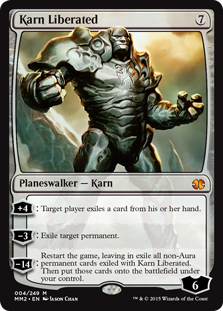 To some extent, all of us will miss the exciting Pro Tour build-up and coverage. Personally, I'll miss it in concept but not in practice---I don't think I could endure more archetype breakdowns like those we saw at Pro Tour Oath. RG Tron under "Control?" Really? Nor will I miss the commentators' uncritical, unambiguous positivity at watching Eldrazi ravage the format. Besides, Grand Prix and SCG Open coverage was always significantly better, offering quality commentary trying to explain the format and decipher play-lines. It did not advertise Modern as something it was not.
To some extent, all of us will miss the exciting Pro Tour build-up and coverage. Personally, I'll miss it in concept but not in practice---I don't think I could endure more archetype breakdowns like those we saw at Pro Tour Oath. RG Tron under "Control?" Really? Nor will I miss the commentators' uncritical, unambiguous positivity at watching Eldrazi ravage the format. Besides, Grand Prix and SCG Open coverage was always significantly better, offering quality commentary trying to explain the format and decipher play-lines. It did not advertise Modern as something it was not.
Beyond realigning both Modern and the Pro Tour with their respective missions, this change is likely to have a number of other wide-reaching benefits. Instead of picking apart all possible objections to the Pro Tour shift (although I'll surely end up doing that either in the comments or in a follow-up article), I'm going to stay positive and list the three biggest boons Modern players look to gain.
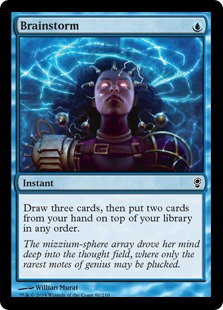 Fewer bans
Fewer bans
This one hardly needs introduction. If Pro Tours meant an accelerated ban schedule on an annual basis, removing Pro Tours should decelerate that process to a longer one. Perhaps much longer---there's no way Brainstorm would've stayed legal for longer than 12 months if Legacy were in Modern's position. Fewer bans means more format stability, which is good for players who want to stick on a deck for as long as possible, and for investors who want cards to hold value. It's also good for new players because it will gradually undercut the ban mania which has characterized Modern for so many years and driven so many away.
- Better communication and transparency
 In the last three weeks, we've seen huge improvements in Wizards' format management. This includes not only Forsythe's article but also the April 4 banlist update, as well as the context behind all of those decisions. The dual Sword of the Meek/Ancestral Vision unbanning signaled intentional follow-up on the January changes. Wizards could have simply banned Eye of Ugin and been done with it.
In the last three weeks, we've seen huge improvements in Wizards' format management. This includes not only Forsythe's article but also the April 4 banlist update, as well as the context behind all of those decisions. The dual Sword of the Meek/Ancestral Vision unbanning signaled intentional follow-up on the January changes. Wizards could have simply banned Eye of Ugin and been done with it.
This suggests a new sensitivity to community preferences. Indeed, it directly addresses many worries across the Modern community, around overly aggressive bans (Wizards only banned Eye), a lack of unbans (we just saw two), and bad communication about format goals (Forsythe laid out nine format guidelines in his article, which you can bet I'll dig into next week). All this sets the groundwork for further transparency and continued communication improvements, both of which are necessary safety valves to ensure Modern's success. I have no idea if the Wizards folks read my "Improving Communication" article, but I'm happy to see its suggestions implemented and hope more "Fixing Modern" ideas are realized.
- More Grand Prix
Here's a controversial one. I imagine many readers will believe the opposite: losing Modern Pro Tours means slowly killing off the format and its events. That's an alarmist position which doesn't line up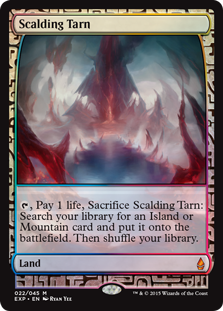 with either Forsythe's article or, more importantly, Wizards' long-term financial health. No matter how much Wizards pushes other formats, there will always be space for non-rotating Magic. That's true now more than ever with the expedited Standard rotation.
with either Forsythe's article or, more importantly, Wizards' long-term financial health. No matter how much Wizards pushes other formats, there will always be space for non-rotating Magic. That's true now more than ever with the expedited Standard rotation.
As long as the non-rotating market exists, the no-Reserved List Modern will uniquely fulfill that need and create numerous opportunities for profit. This includes sets like Modern Masters, more Expedition-style seeds such as those in Battle for Zendikar, and significant tournament attendance by a crowd that is never going to invest heavily into Standard. To tap this market, Wizards will likely double down on Modern Grand Prix, both to communicate its investment in a format with no Pro Tour, and to keep it growing. I expect we see at least 2-3 Modern Grand Prix added in 2017 to reflect these shifts, which is a big gain for the average Modern player.
As a final point, this decision also shows Wizards' willingness to make tough decisions to push the format towards a clear direction. That's Management 101 and Wizards has not exhibited this expertise in the past, trying to cater to too many parties and drifting from Modern's core mission. All of us should be happy to have clearer, but still flexible, expectations around the format. It's a more mature and sophisticated management style which is much more likely to benefit Modern than hurt it.
Next week, I'll return to Forsythe's article to break down his nine format guidelines and relate those back to critical Modern issues. If you can't wait to discuss those, or need to share an opinion on today's Pro Tour topic, head down to the comments where we can talk about all these changes in more detail.
Change is a hard process, and Modern has been in flux ever since January. It's been a rocky few months, but I'm seeing things smooth out with two significant unbans followed by Forsythe's and Wizards' recent press releases. We'll need to see where things are heading after this, but as long as Wizards stays this course and delivers on its new and powerful promises, 2016 looks like it will be Modern's best year yet.


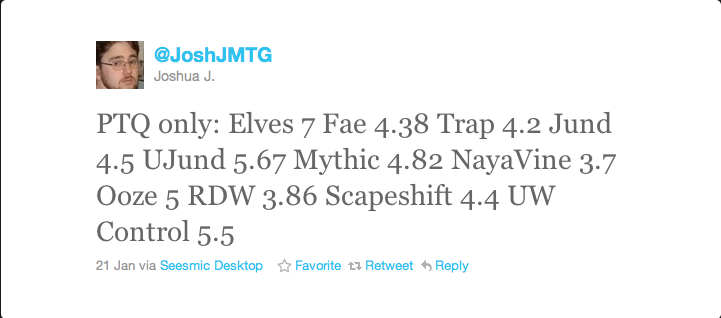


I see how easy it is to talk about those things in “Twin died for this” style, but I won’t. It was somewhat hard but still very deep thought decision to open blue space in Modern that way and now we see Visions freed to brew and create innovative new stuff. Would banning happen were there no Pro Tour? Probably not though, but we can’t tell for sure. Maybe it would eventually. At least speaking of Twin. Summer Bloom is fully justifiable in every aspect including timing.
The Twin ban’s timing was definitely questionable, but honestly, if blue decks keep doing what they are doing, the ban will be worth it. I am much happier with a blue format of AV than one with Twin, especially if AV may one day be joined by other blue-benefitting bans and reprints. We will see how it turns out but I am optimistic!
When I read Forsythe’s article on this all I could think was that he’s communicating very clearly and frankly on the decision and simultaneously laying out the company’s vision for modern. Sounds a lot like the recommendations from your fixing modern articles – coincidence?
And all for the best. I look forward to your followup article going over the new definition of modern and how it compares to the old ones you were stitching together – I think the biggest addition was the desire to have a small ban list.
I’m convinced mox opal is banned this year at some point, and probably simian spirit guide. Maybe with opal gone we could unban the artifact lands to still shrink the overall banlist length. Bloodbraid has to come off at some point too – if someone lives the dream 1/100 matches by cascading into AV good for them – its still not likely going to make temur midrange better than jund or abzan.
No clue if it was just a happy coincidence or if the last article made some small contribution, but either way, I am really happy we got the guidelines. Very excited to unpack them next week too. I think there’s a lot there beyond just a few bulletpoints.
Opal is a card that could go in the next 12 months, depending on how Affinity performs. SSG is a likelier target in my opinion, and probably one that goes with Opal, as you suggest, or before it. At least we can be more confident that any bans will be based on metagame considerations and not Pro Tour demands.
So Aaron Forscythe stated in his article that the PT accelerated the banning of cards. You talked about that in your article. No PT should decelerate the speed of banning, right?
Still one of the first comments is about banning new cards and you agree with the comment. What happened to modern in the US since the PT that mox opal and SSG are só dominant they need a banning nów, because in Europe we apparently missed the boat on that one then.
Sorry, but to me this seems more like an addiction to banlist discussions, than something based on a rationale. I actually think we’ll see more unbannings this year, as Forscythe stated that the banlist should be as small as possible.
My comment made it pretty clear that a possible Opal ban would be based on results from the next 12 months, not from ban mania or pro tour pressures. I have always been about results-oriented bans and if Affinity has the results, I acknowledge Opal is the card to go. That sais, the new PT structure raises the results bar much higher than it was before. You will notice I never said it was likely. Just that it was possible.
Expertly written as always Sheridan. I must say as soon as I read Aaron’s article I said to myself “Holy crap, they’re responding to Sheridan’s articles!” – it’s even formatted almost exactly the same and I was looking forward to seeing your piece (apparently pieces) dissecting his words.
I am with you on Team Optimism and I believe that this is a very important step in the right direction for Wizards to take. Modern as a format has a long road ahead of it in order to bring it in line with what both the community and Wizards wants it to be, but Aaron’s article represents an important milestone showing that Wizards is ready and willing to do their part in order to get us there. We as a community now need to do our part in continuing to show our support for the format that we all love and maintain a consistent and levelheaded dialog with Wizards about our concerns and desires.
Glad you enjoyed the piece! Who knows if the past article informed Forsythe’s update, but however the decision got made, I am just happy it got made at all. Agree with you that we need to stay levelheaded, supportive, and in conversation with Wizards as Modern keeps growing and changing. As long as it stays on this current trajectory, you can bet I will stay the course!
Add me to the list of people who read the article and immediately saw a connection to past MN pieces. Congrats on that. 🙂
I feel pretty neutral about the PT thing, but that’s likely because I’m so new to the format; I’ve no ideas about what it really means (experientially) to be or not be a PT format, so I feel pretty unaffected. That said, AF’s article made sense, so I hope to enjoy the format for a good long while.
I would love to think it contributed to the decision, and it is definitely not that unlikely. However the decision went down, I am happy it ended up like it did and glad so many have enjoyed both Forsythe’s article and my “Fixing Modern” attempts. Also, like you, I also plan on enjoying the format for a long time and these kinds of decisions should give us a lot of faith.
It’s really cool that wizards is obviously reading modernnexus. They seem to follow Sheridan’s suggestions closely, which is great!
Whether they are reading and listening or just reaching the same/similar conclusions, I am just happy with how the format is shaping out since the start of April. Here’s to more awesome Modern to come!
Sheridan, I’ve been playing Magic since 2002, and I have been playing Modern since it was called Overextended and was being developed on MTGO by Gavin Verhey.
This weekend I decided to price out my collection and sell out.
It has become very clear that the hopes player had for Modern (a diverse non-rotating format, where reprints could keep prices in check allowing players to build multiple archetypes) are not at all how WotC saw it. Between that misplaced hope, and the absolutely atrocious player communication about Modern by WotC I don’t see a reason to keep giving the company or the game my time and my money. Specially since evenn if I *were* to give them my money, they have already made it explicitly clear that they will not test or design for my favorite format. OK then.
The removal of the PT was the nail in the coffin. The only time I have even come close to qualifying for the PT was through Modern. The reason is simple: I have neither the time nor inclination to grind Standard or Limited. Modern was a way to play a format where card knowledge accumulated through years of time investment could actually yield dividends. Getting to a Modern GP has often meant traveling long distances and that’s simply not doable a lot of the time.
I hope that your optimism for the format pans out.
I have decided to change hobbies, and it saddens me greatly because MtG is and will be a cornerstone subculture through which I met a lot of great people.
But hey, if enough people like me leave, prices should come down a bit.
They could certainly do some work on the reprints/affordability – perhaps they believe modern masters is all we deserve and never shall there be another instance of thoughtseize, chord of calling, mutavault etc in a standard set (the lack of a frigging cavern of souls or glimpse the unthinkable in SOI is a travesty). That being said a better reason to freak out would have been the twin ban, where it became de jour for Wizards to just ban some random high profile card to create a new format – i.e. forced, unpredictable rotation.
You say you’ve been playing for nearly 15 years – and presumably you did not make the pro tour in those 15 years. But now that they’ve removed modern from the PT your dream is officially over so its time to quit the format? It sounds like you were not likely going to be playing in a PT anytime soon anyways so that’s an interesting rationale for quitting the format/game.
This is also an absurd time to complain about their communication on the format. Last week? Sure. But Forsythe literally just gave a rational explanation for a policy change AND provided literal text on what their vision for the format is. Now if you don’t like that vision, then fine I guess, but they are being remarkably transparent and forthright right now.
Sorry to hear you are cashing out. I definitely feel where you are coming from, as it’s something I will probably do myself in the next couple of years as personal and professional demands change. That said, I do want to speak to one of your fears, both to you and anyone else who has it: that Wizards has failed to build “a diverse non-rotating format, where reprints could keep prices in check allowing players to build multiple archetypes.” I agree these are currently challenges Modern faces, but I also believe the new direction for Modern will really help Wizards fulfill those expectations. It just wasn’t going to happen with Modern as a Pro Tour format, whether with the crazy spikes and hype around PTs, the banlist changes, and the fear around bans and pushed metagame changes.
I’m hoping 2016 sees all that start to change, even if it’s harder for players that do want to play Pro Tour Magic and now can’t do so with Modern. Hopefully you enjoy your next hobbies and maybe come back one day!
Imo there are greater issues you did not get into
1. Modern is no longer a path to the top, top players should focus on standard, therefore standard is more important than modern and the hope of modern being an alternative to standard are dashed
2.this does affect players of many skill levels, I just hate it when I have to trade my gpt victories for credits due to most gps being standard, now I also have to trade all my pptq victories as well… This may be just me but I’d rather try to make a name for myself regionally sometime rather than selling wins for boosters and nobody knowing me, modern can no longer do that, in fact why would modern players want to play in pptqs at all now?
3. I have a hard time believing I am telling this to you, but your assumption about more modern gps, is not backed by any evidence at all, in fact in the long term it could mean less
4. You focus too much on what most players wanted less bans and more talk, but the thing is that neither of those affects the quality of the games we play, we could as well have more bans and 0 communication and yet a better format,those were secondary objectives which people obssessed over but mostly for monetary issues, we got the bonus and missed the primary objective which was having a non rotating alternative to standard
5. The guidelines are meaningless, so they will not introduce cards directly into modern, nor will they ban anything unless absolutely necessary and they will not test for modern either, so what are they going to do to meet their guidelines? Some sort of prayer I guess…
This is not the end of the world, but I have every reason to be cautiously pessimistic , why would I
Happy to respond more directly to these, although many of them are addressed in some form in this article.
1. Honestly, no one should have hoped Modern would replace Standard. That was an unrealistic expectation I would have argued against and one I never even held. It’s also totally outside the scope of anything Wizards promised or implied about Modern.
2. If you want to play Modern at GPs/SCG Classic or Open events/PPTQs/RPTQ/other local tourneys, you can still do so. You can even make a name from it, and the average player and above average player alike can still do that without a Modern Pro Tour. I assume most Modern players play the format because they enjoy its decks, metagame, and community, and not to try riding Modern to the Pro Tour. Given the average tournament prospects of the average player, I’d say this has been the case for years and the update doesn’t change it.
3. Like I said, there is a demonstrable need for a non-rotating format. Legacy is never going to be that format and there is no indication they are replacing Modern with a new non-rotating format. If so, there is considerable profit to be had in adding Modern GPs to just double-down on the non-rotating market. I expect Wizards to add at least a few of these next year to capitalize in these opportunities. If they don’t, consider me off Team Optimism.
4. Ban mania and bans were hugely detrimental to Modern for years. It plays out in games the same way basically any other factor you mentioned, or those I/Forsythe talked about, play out in games: they hang over the play experience and cast a shadow over the format. That prevents people from buying in and scares people away from investment. And again, Modern was never billed as an alternative to Standard to my knowledge. I don’t know why people made this assumption.
As for the guidelines, you’ll have to wait for next week to talk about those. For now, I’ll say your worries are overblown and out of dialogue with both Forsythe’s article and some of Stoddard’s recent pieces as well.
Oh, I do not wish modern to replace standard, only to provide a viable alternative to competitive players, now I feel they can ignore modern completely and focus exclusively on standard
anyways, we’ll see, thanks for the reply
Looking at the amount of events in Europe this year:
– There will be one Modern GP event in France later this year.
– There was one Modern GP event in Italy earlier this year.
Do you think this is viable?
There is, in comparison, one legacy event this year, and 9 Standard/limited events.
That is not viable and will need to be changed after this year. I am hoping, optimistically right now, that Wizards follows up on their recent changes by adding Modern Grand Prix across the board. Europe will need at least one more, ideally two, to make that a viable situation. I am trusting Wizards to follow through with all this by adding at least one European GP next year.